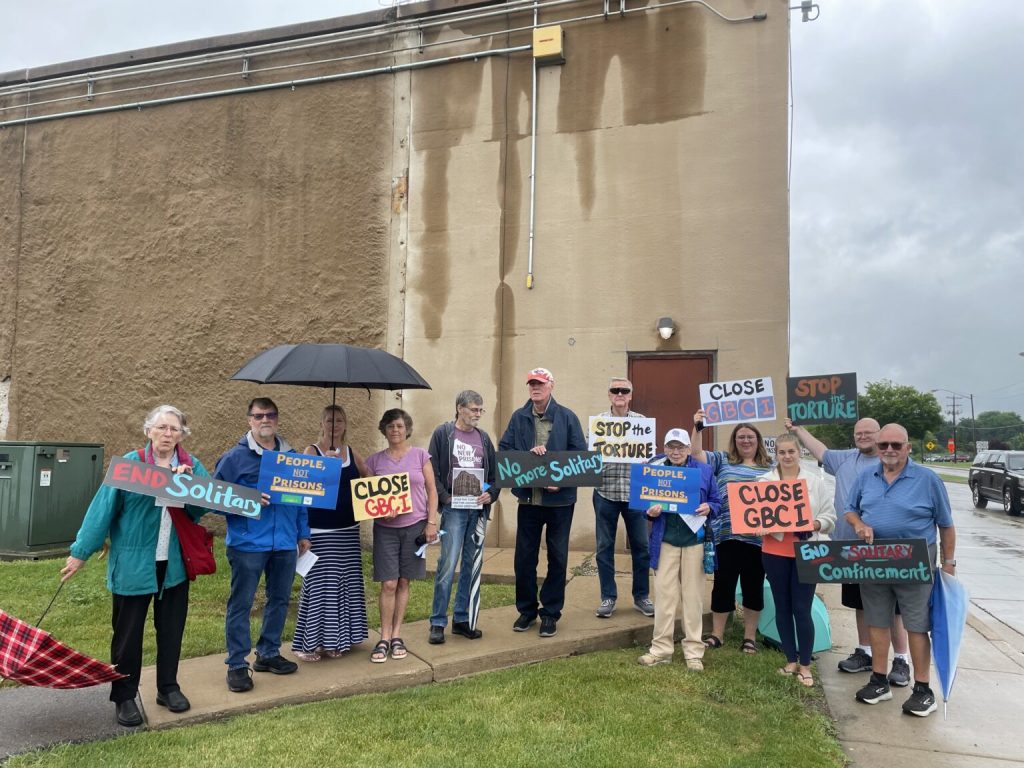Prison Reform Advocates Push for Corrections Ombudsperson
Seeking a GOP sponsor for bill, but 'nobody’s willing to stick their neck out.'

Local advocacy organization JOSHUA held a prayer vigil outside Green Bay Correctional Institution. | Photo by Andrew Kennard for Wisconsin Examiner
Wisconsin Gov. Tony Evers included a prison accountability office in recommendations for the upcoming state budget. That proposal was tossed out by the state Legislature, along with hundreds of others made by Evers. And so far, prison reform advocates haven’t found a Republican sponsor for a separate bill.
The proposed Office of the Ombudsperson for Corrections would conduct investigations, inspect prison facilities and make recommendations to prisons in response to complaints. The proposal would cost about $2.1 million from 2025-2027.
Deaths of prisoners, staffing problems and lawsuits have drawn attention to serious problems in Wisconsin’s prison system.
“How many more millions of dollars are we going to spend in fighting lawsuits, dealing with litigation?” said Susan Franzen of the Ladies of SCI. The prison reform advocacy group wants to see independent oversight of the Wisconsin Department of Corrections.
“We’re willing to spend that money, but we’re not willing to take a million dollars to put something in place that can help start addressing these things and eventually get proactive, so we don’t have all this litigation going on against the Department of Corrections,” Franzen said.
“Unfortunately, [Evers] sends us an executive budget that’s just piles full of stuff that doesn’t make sense and spends recklessly and raises taxes and has way too much policy,” Joint Finance Committee co-chair Rep. Mark Born (R-Beaver Dam) said in May, after the committee killed more than 600 items in Evers’ budget proposal. “So, we’ll work from base and the first step of that today is to remove all that policy… and then begin the work of rebuilding the budget.”
Meanwhile, the Wisconsin Department of Corrections has already partnered with Falcon Correctional and Community Services, Inc., a consulting and management firm, for a third-party review.
The Falcon partnership includes a comprehensive study of the Division of Adult Institutions’ health care program, behavioral health program, correctional practices and restrictive housing practices, the Examiner reported. The study was projected to take six months.
What Republican lawmakers are saying
In February, Gov. Tony Evers laid out a plan for changes to the prison system, including closing Green Bay Correctional Institution and updating Waupun Correctional Institution.
Rep. Jerry O’Connor (R-Fond Du Lac), vice chair of the Assembly Committee on Corrections, said “our first priority” is addressing staff shortages in various areas, ranging from guards to social workers.
For the most recent pay period, the DOC reported a vacancy rate of 16% for correctional officers and sergeants at adult facilities. Columbia Correctional Institution has the highest vacancy rate among adult facilities, at 35.4%. Waupun and Green Bay Correctional Institutions have vacancy rates over 20%.
The second priority O’Connor listed in an email to the Examiner is the hundreds of millions of dollars needed for facility reorganization.
“Based on the pressing financial requests for address[ing] critical staffing shortages and housing issues, I do not see [the governor’s recommendation for an ombudsperson office] getting passed or funded,” O’Connor said.
Senate President Mary Felzkowski (R-Tomahawk) criticized the potential structure of the ombudsperson’s office, Wisconsin Public Radio reported in February.
“De facto lifetime appointments (which the ombudsperson appears to be), almost a dozen new bureaucrats, and millions of dollars are not creative solutions,” Felzkowski said, according to WPR.
Would the ombudsperson be independent?
To Franzen, “it feels like we’re back to square one, with the original plan of trying to get a bill, and we’ll keep trying,” she said.
Ladies of SCI Executive Director Rebecca Aubart said she is still hopeful about finding a Republican to sponsor an ombudsman office.
Aubart said she’s heard support for oversight of the DOC, , “but it just appears that nobody’s willing to stick their neck out to be the one to sponsor it,” she said.
The Examiner reported in October that 20 states had an independent prison oversight body. Michele Deitch, director of the Prison and Jail Innovation Lab, wrote about independent oversight in an essay published by the Brennan Center in 2021.
“They can identify troubling practices early, and bring these concerns to administrators’ attention for remediation before the problems turn into scandals, lawsuits, or deaths,” Deitch wrote. “They can share best practices and strategies that have worked in other facilities to encourage a culture of improvement.”
The proposed Office of the Ombudsperson for Corrections was described in a summary of the governor’s corrections budget recommendations. It would be attached to the Department of Corrections.
Officials in the Evers administration said the office would operate in a “‘functionally independent’” manner, Wisconsin Public Radio reported in February.
Franzen said she’d rather it be completely separate from the DOC, but would support any movement toward some type of oversight at this point. Aubart said independence is a “cornerstone to any ombudsman.”
What would the office do?
The proposed office’s powers include conducting investigations, having witnesses subpoenaed, inspecting facilities at any time and examining records held by the DOC.
If the ombudsperson made a recommendation to a prison regarding a complaint from a prisoner at the facility, a warden would have 30 days to reply. The warden would have to specify “what actions they have taken as a result of the recommendations and why they are taking or not taking those actions.”
If there was reason to believe a public official or employee has broken a law or requires discipline, the ombudsperson could refer the issue to the appropriate authorities.
The ombudsperson would report to the governor at the governor’s request. Each year, the ombudsperson would submit a report of findings and recommended improvements to policies and practices at state correctional institutions, as well as the results of investigations.
Mark Rice, transformational justice campaign coordinator at the advocacy coalition WISDOM, said he also wants to see an additional mechanism to hold the Wisconsin Department of Corrections accountable.
“Currently incarcerated people, and people who have loved ones who are currently incarcerated, need to really be more at the center of decision-making,” Rice said.
The co-chairs and vice-chairs of the Joint Committee on Finance did not respond to the Examiner’s requests for comment.
Advocates ‘back to square one’ on prison oversight advocacy was originally published by the Wisconsin Examiner.
If you think stories like this are important, become a member of Urban Milwaukee and help support real, independent journalism. Plus you get some cool added benefits.




















